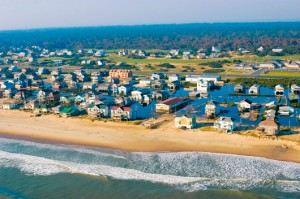With Billions Living Close to the Shore, Protecting Our Oceans Isn't Just a Conservation Issue
 With two fifths of the world’s population now living within 100 km of the shoreline, keeping our oceans healthy is not just an extraordinarily important environmental issue — it’s also a human development one.
With two fifths of the world’s population now living within 100 km of the shoreline, keeping our oceans healthy is not just an extraordinarily important environmental issue — it’s also a human development one.This is the core case of the new UNEP Report, “Green Economy in a Blue World,” which urges protecting the oceans from pollution, overfishing, and climate change, while fueling economic growth through developing new marine industries.
Among other immeasurable benefits, the ocean provides coastal populations food, millions of jobs, a thriving tourism industry, transportation, sites for renewable energy development, and vast carbon sinks. The implications of mismanaging such a bountiful resource are clear and coastal communities cannot afford to do it.
Achim Steiner, UNEP Executive Director warns that with the growing population, “pressures and impacts [on the ocean] are likely to intensify unless the world becomes more intelligent about managing these essential resources.”
The report outlines management strategies in three main areas: existing industries (fisheries, tourism, and maritime transportation), emerging industries (wave, wind, and deep sea minerals), and ocean nutrient pollution (agriculture, wastewater, and fertilizer).
To existing marine industries, UNEP outlines strategies for smarter fisheries management, which can help reduce carbon emissions, replenish stocks, and help local communities. According to the report, restoring fisheries stocks around the world could add $50 billion a year in value to the fishing industry.
The report also makes a strong case for marine-based renewable energy, including wave and wind, calling on countries to make greater investment in research and development. The marine-based renewable energy sector is an alternative for struggling coastal communities that may have taken a hit by struggling coastal UNEP estimates that wave energy has the potential to provide almost four times the current global electricity production, while wind has the potential to provide almost double. For these technologies to develop and scale-up, governments need to assist the industry in overcoming technical and cost barriers. The report also calls for the careful exploration of deep-sea minerals as a new revenue stream, ensuring the preservation of the fragile deep-sea ecosystem.
Many countries, including the United States, have begun taking ocean policy seriously. President Obama has established a National Ocean Policy, dedicated to protecting American oceans, coasts, and the Great Lakes. American fisheries are rebounding. Off-shore wind projects like Cape Wind, and Fisherman’s Energy are investing in cleaner energy and economic development.
This report calls for all countries to continue developing policies and practices that ensure healthy oceans and healthy economies for generations to come. It not only sustains one of our most important ecosystems but the livelihood of millions.
You can return to the main Market News page, or press the Back button on your browser.

